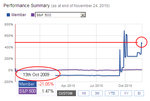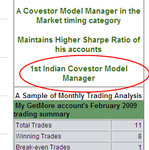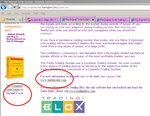checking out first 100 links from "intraday strategies" search
Resuming from here:
http://www.google.com/search?q=intraday+strategies
I customized my search to open links on a new page and to show 100 links per page.
I will now go through every single link from top to bottom, until I will have covered about 100 links.
Discarded:
http://www.traderji.com/technical-analysis/8087-triple-top-bottom-intraday-strategy.html: I don't like the look of it, not focused.
http://www.trade2win.com/boards/fre...ay-strategies-feedback-ideas-appreciated.html: "...but will make a profit overall – HOPEFULLY". He doesn't have a profitable strategy yet.
http://www.ehow.com/way_5891037_intraday-strategies.html : good but just a synopsis.
http://www.allbusiness.com/banking-finance/financial-markets-investing-securities/10628929-1.html : multiple time-frames are too complex to implement on tradestation.
http://forexforums.dailyfx.com/scalping/13878-scalping-intraday-trading-strategies-discussion.html : as I have learned in the last few hours, forum posts on trading strategies are usually a waste of time: information is too spread out. I will skim through them from now on, and easily discard them. A web site with a web page on trading strategies is like a book: focuses and treats the topic from start to end. A forum thread is like people discussing the subject at the restaurant. After all books do have at least this one quality over forum threads.
http://optionstrader.joymastery.com...-are-the-best-ways-to-start-learning-trading/ : interesting but not enough info on what I need.
http://www.intradaytrades.com/day_trading_system.html : "How Does It Work? Simply subscribe today and...". Not what I need.
http://www.ehow.com/way_5305189_intraday-stock-trading-strategies.html : just a synopsis
http://www.realcool.biz/Very_short_term_intra_day_strategies__t5144.html : suggested strategy trades too rarely.
http://www.forex-tsd.com/suggestion...23-unholy-grail-system-intraday-strategy.html : it sounds good but it requires metatrader.
http://www.acetraderfx.com/eng/ : the web site is a mess and unreadable.
http://nettopdf.info/en/ebook/intraday strategies-1.html list of .pdf books with intraday strategies, useless - probably it doesn't even work. In fact I did think - just now - of looking up strategies in a .pdf book (I have many) but books have the gift for bull****: preface, acknowledgments, you have to read 5 chapters before you find out if there's anything good in the book. So web sites are much much better. Screw books.
http://intradaytradingtips.org/forex-day-trading-strategy : too complex, but very promising (95% success rate). It sounds a bit like the Forex Morning thing. I'll have to discard it because it's too complex. I couldn't automate such a strategy, merely because it uses a stoploss. But another problem is that this guy doesn't explain things clearly.
http://www.jobisjob.com/chicago-il/...rategies/job-offer-7zfmguarus2wp7xdxgp6imo3le : interesting job offer for traders who
already have a strategy but not what I am looking for.
http://www.daytradingshares.com/monthly_profit_daytrading.html : advertisement, more or less.
http://www.tradestation.com/strategy_testing/hist_market_data.shtm : ad
http://directoryofbusinessdirectories.com/blog/tag/intraday-strategies : no strategies, just tips
http://forums.babypips.com/free-for...91-1m-snapper-momentum-intraday-strategy.html : it gives you a clear description of a strategy, but it's too complex to implement.
http://www.tradingmarkets.com/etfs/...y-weakness-and-intraday-strength-1094581.html : it only works if you use their product.
http://www.online-stock-trading-guide.com/intraday-trading-strategy.html : this is about a discretionary method that uses the correlations among markets to predict price. Too complex to automate.
http://newtonlinchen.wordpress.com/2009/05/22/what-kind-of-ratio-do-you-use-for-intraday-strategies/ : this is not what I need but interesting.
This brazilian guy is at a very advanced stage of programming trading systems.
http://www.elitetrader.com/vb/showthread.php?threadid=148718 : usual forum thread wasting my time.
http://ultimaforex.com/forex-tradin...imple-but-profitable-intraday-forex-strategy/ : clear strategy but it's for metatrader.
http://www.tradercurrencies.com/cur...gy-nifty-intraday-tips-for-beginning-traders/ : ad
http://www.marketgems.com/The_Earnings_Play_the_good_the_bad.pdf : "The earnings play", this is fundamental analysis and other things not good for me.
http://ezinearticles.com/?Intraday-Trading-Tips-and-Strategies&id=4857147 : good summary of strategies but no explanation of the strategies with enough details.
http://ezinearticles.com/?Best-Intraday-Forex-Trading-Strategies&id=1108767 : this is the biggest bull**** title so far. It has a brief synopsis of trading but no strategies at all.
http://www.straightstocks.com/market-commentary/intraday-swing-trading-strategies/ : they keep telling me "we did this, we did that", but don't tell me the rules of the system.
http://www.tradingstrategyhosting.com/Content/strategies.php : it just tells me that with their software i can create any strategy I want, but it's not telling anything about strategies.
http://www.buzzle.com/articles/intraday-trading-strategies.html : terrible naive advice, probably written by someone who's not profitable and has traded very little, if ever.
http://www.icharts.in/forum/prides-intra-day-strategy-t2132.html : this seems good stuff (simple, clear, short, profitable, sincere). But too hard to automate.
http://www.articlesbase.com/investing-articles/intraday-trading-strategies-2970557.html : as dumb as buzzle.com's article, two links above.
http://www2.wealth-lab.com/WL5WIKI/...temIntraday&NS=&AspxAutoDetectCookieSupport=1 : code to build strategies, but no strategies.
http://beforex.info/page.php?19 : option expiries strategy. Too hard to automate. But this post seems in good faith. Web site looks awful, including the customized mouse pointer - which adds to the reliability of what they are saying (they're not marketing anything for sure).
Intra-Day Trading Strategies: Proven Steps to Trading Profits with Jeff Cooper : book with strategies, but as i said, I won't delve into books, because they're the kingdom of bull****.
http://www.forexhub.biz/trading-strategies/strategies/359-5-minutes-intraday-strategy.html : too complex to automate.
http://www.moneymakergroup.com/Intraday-Trading-Strateg-t332357.html : usual forum bull****.
http://www.fxstreet.com/forum/showthread.php?t=646 : good stuff (clear, sincere, detailed), but too complex to automate.
http://www.askobid.com/forex-trading-analysis/type/7/review/267 : mis-titled post.
http://www.forexfactory.com/showthread.php?t=13873 : forum thread, better than average, but still unusable.
http://www.selfgrowth.com/articles/advantages_of_intraday_trading : good article by a balanced and reasonable trader, but the only trading strategy suggested is based on support and resistance and I can't automate it on tradestation. Maybe it's time to learn to do that. No, screw it.
Kept (golden links):
http://www.marketcalls.org/2008/06/simple-intraday-strategies-to-be.html : easy to test (his "volatility" could be a requirement for today's range to be more than x). Personal blog by Rajandran R, who also has this other similar
blog.
http://www.chart-my-trade.com/joefernandes.html : Personal blog by
Joe Fernandes. Whatever strategy this guy is showing me, I can trust him. I can tell, just by reading his "about me" page. I need to check out his web site extensively.
http://www.tradingmarkets.com/.site...sing-the-E-mini-SP-500-to-Trade-Opt-81380.cfm : article from a commercial web site with many experts' articles. Whatever it is, this is good stuff, as this guy has traded for 30 years and he's explaining in detail some of the things he knows.
http://www.online-stock-trading-guide.com/intraday-trading-strategies.html : part of a course on a commercial web site (selling signals): list of intraday strategies. Very concise descriptions. This is good.
http://www.zentrader.ca/blog/?p=2272 : this is good, too. Personal blog by
Jeff Pierce. Whether he tells me about a system or not, it will be interesting to read. This guy started trading from newspapers: very useful perspective.
http://proforex.blogspot.com/2006/05/swing-trading-vs-intraday-trading.html : another good unknown personal blog.
http://www.inditraders.com/beginners-section/2145-strategies-formulae-intraday-trading.html : forum thread with simple strategies just like the ones I like. Unusually good content for a forum. Need to check it out in detail.
http://www.activetradermag.com/index.php/c/Trading_Strategies/d/A_compass_for_intraday_markets : this is good. A simple to automate and insightful strategy: "...the following intraday strategy uses the opening range of the regular stock-market session to identify a static entry point with the goal of capturing the major move of the day".
http://www.bearcave.com/software/market_trading/intraday_trading/ : personal blog by
Ian L. Kaplan. I don't know if this is going to suggest any trading strategies but it is going to be interesting and probably useful.
Summary
For today I will stop at 50 links analyzed. Tomorrow I will do another 50. Then I have to stop and investigate further on whatever I found that was good, and later do even more targeted searches, depending on what the good links have in common.
So far, the links are 5 personal blogs out of 9 good links. In case I decided to follow this direction, I can find more blogs on the blogs themselves, on their links pages. Otherwise, it's articles by experts, and i can find those right here on trade2win.
Another tendency seems to be (in favor of unknown blogs) that the more known is the author the less insights he shares. I think i will go for unknown blogs first.
Another thing to note is that Indian traders seem to be very open about their strategies and helpful (two out of 7 good links are from India). I need to search in those Indian trading forums.
So far, on the other hand, I've created dozens of systems just by looking at a chart. So I could very well go back to that approach if this approach doesn't produce any systems.
So, the things to do will be:
1)
unknown trading blogs (but not on forums, because then they get crowded with useless posts). This is the best, also because I don't need to look for "intraday strategies". Every trader's blog will talk about his strategy. Personal blogs are good because much like this journal (except with less bull****) people are free to talk without being interrupted by stupid posts with smileys. They're like a book except without preface and acknowledgments and all that bull****. A book that gets straight to the point.
2)
experts' articles collected even on commercial web sites: the more unknown the expert the better.
3) go back to
my own chart analysis and creating systems on that alone: in that case I would buy ts-evolve because it gives me an edge.
First I will have to go through another 50 links though. I'll do that tomorrow, mostly at work.
No, screw this. I have to stop here. I don't have the time to do another 50 links.
I'll do them if I run out of ideas. There's plenty of stuff to investigate with what I have done so far. I won't keep on surfing the web for first phase ideas, when i have reached second phase, thanks to the precious links above. I can't wait to get started reading that good material. Anyway, I've already identified where the good stuff on the web is, as far as intraday strategies (see summary above).
So what is next is
reading each one of those 9 links and letting them lead me to create more systems. I may or may not write a single post on every link. Sometimes it helps me work harder, so it's useful, but other times it slows me down (obviously). It always slows me down: but if the alternative is to not read because I don't feel like it, then it's better to be slowed down and to read. If instead my curiosity will make me read those links, then I won't need to write about them here. In which case I will write short summaries about them. Yes, because in fact I don't write all this stuff to teach others, but to make myself work, to keep myself working and focusing on the things I am writing about. If I weren't committed in front of everyone to do these things, probably I'd be watching tv right now.











